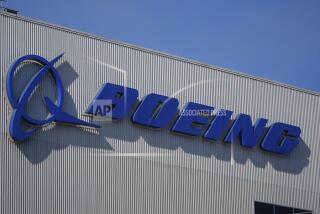Seattle Area Gratified, Guarded as Its Top Employer Extends Reach
- Share via
SEATTLE — For a city that became the headquarters of the largest aerospace company in the world overnight, the news Sunday of Boeing Co.’s buyout of McDonnell Douglas Corp. was an added jolt of turbulence in one of the most tumultuous years in the history of the aerospace industry in the Pacific Northwest.
Although the merger is widely expected to stabilize and strengthen the future of Boeing’s flagship operations in Washington’s Puget Sound region, it also raises worries among workers about whether future production increases could be siphoned off to Southern California--and whether the company’s hiring boom here is at an end.
The question is not an idle one, given Boeing’s historic position as the economic bedrock of Seattle and cities in the surrounding metropolitan region: “As Boeing goes,” the local joke has always run, “so goes Seattle. And Bellevue. And Renton. And Everett. And so forth.”
Boeing accounts for one out of every six jobs in the area, and has just undergone one of the biggest one-year employment swings in the company’s history. From an employment cut of 12,000 Seattle-area jobs during a downturn in 1995, the company has done a staggering about-face and added 13,000 jobs this year, a figure that could go as high as 15,000 by the end of the year.
Thus, the biggest question many in Seattle have about Sunday’s buyout announcement is how far Boeing will go to transfer excess production demand to idle McDonnell Douglas facilities in Long Beach--a road already explored, at least tentatively, with an agreement earlier this month to collaborate on the development of future Boeing wide-body passenger jets.
“The news is generally good, but you’d want to be worried about the extent [to which] over time they transferred Seattle-based work to McDonnell Douglas,” said David Harrison, a former economic analyst with the University of Washington’s Northwest Policy Center.
Local officials greeted the announcement with overall enthusiasm, although few had time to react on a day dominated here by news that the local baseball team was being put up for sale.
King County Executive Gary Locke, who will be sworn in as Washington’s governor in January, issued a brief statement, calling the merger “absolutely great news.”
“This will truly stabilize Boeing’s future in the aerospace industry,” Locke said. “It will make for a much stronger partnership to compete against Airbus [Industrie, the Europe-based No. 2 builder of civilian airliners]. It can only have positive impacts on employment in the Pacific Northwest.”
*
Employees had not been told about the buyout before Sunday morning, but many said the talks between the two companies over the last several months left little room for surprise.
“It’s not an unexpected development in terms of recent history in the aerospace industry. But everybody’s kind of in the dark, as far as the employees go,” said one longtime Boeing engineer who asked not to be identified.
In fact, he said, the news is likely to be greeted with relief by many Boeing workers who feared the kind of production overload that characterized skyrocketing orders in the mid-1980s, forcing many employees to work overtime, seven days a week. “Nobody wants to go back to that,” he said, “so the idea that McDonnell Douglas would be [developing] components of the Boeing aircraft [in the contracting arrangement announced earlier] sounded like a good one.”
Boeing has orders for 618 aircraft valued at $46 billion this year. That, and the development of a larger 747 jumbo jet, has pushed factory capacity to the maximum.
Local economic analysts said the merger would strengthen the overall health of the company by fleshing out its military capabilities and arming it in the increasingly tough competition against Airbus.
How Boeing fares in the international commercial airline market continues to be a matter of vital interest to Seattle, despite its optimistic boasts that it has significantly diversified the regional economy.
(BEGIN TEXT OF INFOBOX / INFOGRAPHIC)
The Boeing-McDonnell Douglas Merger
Seattle-based Boeing is known for its commercial jetliners, the latest of which is the 777. McDonnell Douglas of St. Louis builds commercial and military planes as well as components for space vehicles, inclusing the space station.
WHAT THEY MAKE
McDonnell Douglas
F/A-18 and F-15 fighter jets, C-17 cargo plane, Harpoon missiles, Apache helicopter, Delta rockets, MD-90 and MD-11 commercial jets.
Boeing
737, 747, 777 and other commercial jets, AWACs military radar plane, proposed F-22 fighter jet, international space station, space shuttle operations, rocket engines.
WHAT BOEING GETS
The three major McDonnell Douglas programs in Southern California that would be acquired by Boeing:
*--*
Site Program Employment Long Beach C-17 military cargo plane 10,000 Long Beach Commercial jetliners 10,000 Huntington Beach Delta rockets/other space work 5,600
*--*
Sources: Defense News, Aerospace Industries Assn., company reports
More to Read
Inside the business of entertainment
The Wide Shot brings you news, analysis and insights on everything from streaming wars to production — and what it all means for the future.
You may occasionally receive promotional content from the Los Angeles Times.








